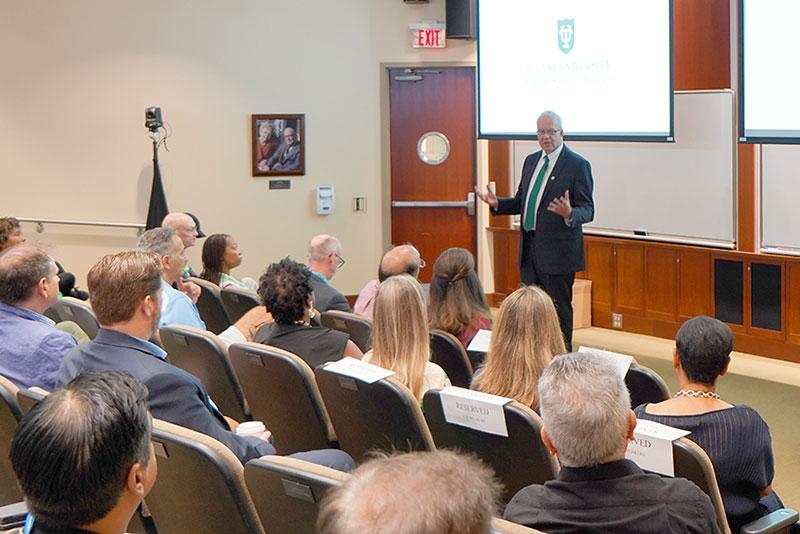Goes highlights growth and quality in annual ‘State of the School’

With an expected decline in the number of college-age students over the next decade, universities nationwide are bracing for what’s been called the "enrollment cliff," but during his annual State of the School address, Dean Paulo Goes laid out a decidedly more upbeat vision for the Freeman School of Business.
“The state of the school is excellent,” Goes told a standing-room-only audience in the Goldring/Woldenberg Business Complex. “Why is it excellent? We have to start with the state of Tulane University. Tulane is going through an outstanding period.”
Goes delivered the address on Nov. 8 as part of Wave Weekend, Tulane’s annual celebration that combines homecoming, class reunions and Parents Weekend. More than 1,500 Freeman School alumni, parents and friends signed up for events including tours of the business school, a reunion party at the Columns Hotel, and tailgating on the Berger Family Lawn before the Tulane-Temple football game.
“We’re getting close to 600 students — a third of those 1,800 — and we pick up more who come in as undecided and then transfer to the business school. That’s a great problem to have.”
Paulo Goes, Freeman School dean
Tulane welcomed a freshman class of more than 1,800 students in fall 2024, and while many were attracted by the university’s national reputation, Goes said many were also attracted by the Freeman School, in particular the school's unique admission policy.
“Tulane is the only university that I know that doesn’t have a second admissions process for business,” he explained. “We’re getting close to 600 students — a third of those 1,800 — and we pick up more who come in as undecided and then transfer to the business school. That’s a great problem to have. Any business likes to have high demand for its services, and that’s where we are.”
As one of just a handful of elite business schools with undergraduate programs, Goes said the program is built on four pillars: rigorous academics, development of essential soft skills, robust career services and professional development, and a focus on engaged learning and industry collaboration.
“Experiential learning is a big part of what we do,” he said. “Learning by doing [means] working with industry, working with companies and bringing real projects to the students.”
As part of the Freeman School’s five-year strategic plan, Goes has worked to integrate experiential learning throughout the curriculum. With the support of the new Center for Experiential Learning, Goes said Freeman is introducing a new capstone course that will enable every undergraduate student to consult with local entrepreneurs, nonprofits and startups.
That student-centric mindset extends to graduate programs as well. Goes said specialized master’s programs in energy management, business analytics, finance and accounting are thriving, with the Master of Management in Energy program achieving a remarkable 100% employment rate for graduates. Goes said the program, which leverages the Tulane Energy Institute, is a key differentiator for the Freeman School.
Freeman also recently launched a new online MBA, now with 59 students, and is in the process of redesigning the part-time Professional MBA to offer a flexible hybrid format.
“I can't think of a top business school without a top MBA program, so we are working on that.”
Overall, Dean Goes painted a picture of a business school on the rise, laser-focused on preparing the next generation of business leaders through rigorous academics, real-world learning, and unparalleled career support.
“There’s a lot of great things happening here,” Goes said in conclusion. “The state of the school is excellent.”
To see photos from this year's graduate reunion party, visit the Freeman School's Flickr page.
Interested in advancing your education and/or career? Learn more about Freeman’s wide range of graduate and undergraduate programs. Find the right program for you.
Other Related Articles
- Forbes: AI Eating Tech And Other Jobs? It’s A Matter Of Perspective
- Research Notes: Paulo Goes
- CBS Detroit: How is AI impacting entry-level jobs?
- Freeman announces new administrative appointments
- AACSB Insights: Reinventing Teamwork - AI in the Business Classroom
- Best Colleges: This MBA Program Is Using AI to Boost Human Skills
- Tulane Business Forum spotlights industries powering Louisiana economic growth
- Freeman recognizes more than 700 graduates at 2024 diploma ceremonies
